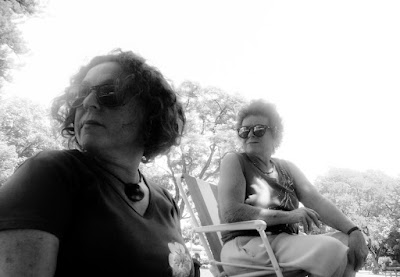SIARAD: Book Review by Georgina Coburn
"Having seen her performances as a finalist in the 2018 and 2019 Australian Poetry Slam competitions online, I was looking forward to reading Caroline Reid’s debut collection of poetry and prose, Siarad. Based in Adelaide, Australia, Reid’s work has been published in literary journals such as Verity La, Red Room Poetry, Cordite and her poem Lost was shortlisted for the 2019 Ó Bhéal International Poetry-Film competition. In Siarad, Reid’s ferocious honesty, sensitivity and acuity leaps off the page as it does on stage, fuelled by personal experience and acute social observation. Siarad, a Welsh word meaning to talk or speak, reflects Reid’s family history and this collection, drawn from over a decade’s work, is testament to finding your voice as an artist. In form and content this is a gift of a book, raw, lyrical and darkly humorous, which delivers profound moments of recognition about what it is to be human.
Reid plunges the depths of our most intimate human relationships and articulates beautifully a state of maturity, reaching a point in life where ‘loving -disappointment-not being dead’- the possibility to ‘change or cease’ must be confronted. The flow of poetry, spoken word poems, flash fiction and longer stories packs a punch, an emotional roller coaster which made me laugh out loud and cry in the one sitting. Siarad is a book of social and cultural commentary, heart breaking loss and inspiration with a consistent element of surprise. The stream of consciousness and childhood memories of Immigration 1973, instantly cinematic prose of Cooked Bones and searing, poetic reflections of Sister are examples of Reid’s fluidly expressive language and rich, cross-disciplinary approach.
Speaking out loud Reid grapples with taboos on many levels; perimenopausal sweat coexists with potent female desire and choosing childlessness is refreshingly devoid of pity or regret. In A ceremony to commemorate the golden jubilee of Queen Elizabeth II Reid tackles Commonwealth legacy and reconciliation, removing monarchy from its pedestal in ‘teaching the old lady in her big white shiny bathroom’ ‘how to dance crocodile.’ The image of the dancer stumbling on unfamiliar ground, then borne aloft by ‘sticks chattering a language - like Cicada – like Blood at high tide’ brings a sense of burgeoning cultural awareness to light. The way that Queen and Aboriginal dancer are described affords the same human dignity, humour and empathic response to both. It’s a poem levelling the colonial power structure in a baseline of humanity. Reid introduces the idea of ceremony freed from commemoration and foreign dignitaries, suggesting that 40,000 years of culture has much to teach us. The universal identification with sweat, pee and ageing is another great leveller in this poem, delivered with characteristic frankness.
In 600,000, Reid addresses the inadequacy of Aged Care legislation, coupled with the painful realities of living with Dementia. Something Strange is going on inside the sun will resonate with many in terms of ‘memory’s broken bones’ and the need for carers to hold memory and identity in trust for moments when they may be found again. The rhythm of Reid’s language ‘Here are your people…’ invokes the need to sing memory back into existence, echoing the Celtic/ bardic tradition and reminding me of Carmichael’s collection of Scots Gaelic hymns, incantations, Poems, proverbs and songs Carmina Gadelica/Ortha Nan Gaidheal. Poetry is an act of survival, in the immediate present and in the process of speaking out. The final stanza of this poem is heart rending in its truth. The role reversal between mother and daughter and simple joy of human recognition in that embrace are bittersweet. This edge of eloquence permeates Reid’s best work, which is about confrontation and humanity. In Something Strange is going on inside the sun confrontation is shot through with unconditional love and an abiding need to make sense of who we are.
Sister is a poem of pure guts and heart. Reid explodes the great unsaid about family ties, coming to terms with a blood relative as a person, facing the person you have become. The tension between grief and self-determination, myth and family are compelling, raising questions about the nature of our relationships and the resolution of inner conflict. What’s inspiring about Reid’s writing is that it isn’t afraid to explore unpleasant truths. There is a strong sense of Oz iconoclasm, a willingness to experiment, dissolving ‘the bodyguards of language’ in the process. As an ex-pat living in Scotland, Reid’s writing culturally strikes a particular chord in the way that it questions not just the status quo, but the role of the artist. The down to earth interrogation of the poet in Liar and of the individual in ‘(Activism)’ is refreshing, a quality honed in standing for and behind your words on stage. During this lockdown, Siarad is being recorded as an audiobook, scheduled for release in Oct 2020 and this direct translation of the author’s voice feels timely, perfectly in keeping with speaking aloud and speaking out. Referencing ‘wicked wonder women’, ‘teachers and leaders,’ Reid’s Being Human confronts where we are as a species, the idea of agency and future inheritance.
From the brilliantly wry observations in Satisfied,
to the meditations on life lived in the spaces between poems in Lost,
what shines through Siarad is the power of language to evolve, process
and express our most deeply held experiences"
Georgina Coburn, June 2020



Comments